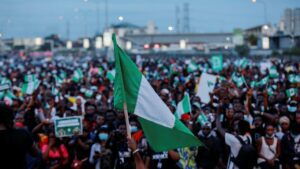
Government must address lingering currency crisis
The ongoing currency crisis caused by a shortage of new naira notes amid several challenges Nigerians struggle with on a daily basis. Just like the suffering caused by fuel scarcity many Nigerians now spend hours queueing for cash from ATMs across the country.
The currency crisis has become a pain in the axe of many Nigerians as the lack of cash in ATMs, Point of Sale, POS and other agents further heightens Nigeria’s economic challenges.
Despite the Central Bank Governor Godwin Emefiele announcing a 10-day extension to the deadline to phase out the old currency, Nigerians continue to decry the scarcity of the new naira notes.
The Jigawa State Government raised concerns over the scarcity of new naira notes, saying residents of the state are sleeping at Automated Teller Machines stands.
The state’s Commissioner of Finance and Economic Development, Babangida Gantsa, said during his visit to several commercial banks in the state on Wednesday, no fewer than 250 customers queued at ATM stands for cash withdrawals.
Gantsa explained that the unavailability of naira notes in circulation had paralyzed economic activities and other social lives in Jigawa.
A similar situation is ongoing in FCT, Lagos EDO, Delta, Nasarawa, Niger and Nationwide.
The glaring reality is that the new notes are scarce. Therefore, the CBN, which insists that the new notes are available, is not truthful. A new polling by NOI Poll commencing on January 9 stated that over 40 per cent of adult Nigerians had not seen the new notes since they were first issued mid-December. Nigerians are being exploited by PoS operators, who are charging as high as N200 to withdraw N1,000!The policy is just compounding the suffering of the masses.
The chaos began in December when business owners started rejecting the old notes. The reaction of the CBN to this was to state that the new notes were available at the banks. This is difficult to believe as the ATMs had none. The faulty implementation, especially with the short time given to actualise it, is turning it into an organized perplexity.
For now, the policy is breeding disorder. There were reports that some customers threatened physical assault against bank officials because they could not get cash. Not only that, crooked bank officials are exploiting the gaps as they allegedly sell the new notes to politicians at premium. Originally, the policy was targeted at preventing politicians from using money to buy votes and influence elections. The threats by Emefiele to sanction the banks for sabotaging the policy seem like an empty threat. So, the CBN needs to walk its talk.
In the rural areas, where financial exclusion is very high, the deadline might wreck more havoc on livelihoods. In December, the World Bank warned that the timing and short transition period of the policy could negatively affect small and medium-sized businesses and the poor, 133 million overall. NGO Inclusion for All Initiative said 54.4 per cent of the rural population might lose their savings to the policy.
According to CBN the policy wants to recover the N2.73 trillion outside the banking system. As of October, currency in circulation was N3.23 trillion. Of that, only N500 billion was traceable in the banking system. That is a huge gap. Emefiele said, “So far and since the commencement of this programme, we have collected about N1.9 trillion, leaving us with about N900 billion.”
But in Nigeria, the informal sector sustains the economy. London-based World Economists says Nigeria’s informal economy is 57.7 per cent of GDP. World Bank data states that 80.4 per cent of all employment in Nigeria is in that sector.
Unfortunately, the economy is deteriorating. For the second time in three months, Moody’s, a global credit rating agency, downgraded Nigeria from (P)Caa1 to Caa1 (junk) at the weekend. This is Nigeria’s lowest since 2006, a period of 17 years.
On these counts, the policy, which elevates cashless above cash transactions, is precipitated. It will constrain the economy further, as for now, the informal sector is still largely dependent on cash transactions. A Nigerian NewsDirect in this editorial urged the CBN to seriously consider averting a deteriorating breakdown of Nigeria’s economy.
Again, the cashless policy, good as it is, would continue to evolve. In Nigeria, the available internet infrastructure cannot yet support a brisk online economy the CBN wants to build. For instance, the recent reliance on internet banking has resulted in a breakdown, Nigerians can no longer carry out transactions on the space.
Nigerians are losing money and time to incomplete ATM transactions, they are being debited for transfers that fail, even with the same bank. In this situation, the cashless policy should be implemented in phases.
Lessons from other jurisdictions support those who argue that the 10-day extension period is still too short. The Bangko Sentra ng Pilipinas, which launched a redesign of its P1,000 currency from paper to polymer in April 2022, has given a timeline of one year to fully implement the policy in the Philippines. In December, the Bank of England unveiled its redesigned £5, £10, £20, and £50 banknotes that will carry the portrait of King Charles III to replace that of Queen Elizabeth II. However, the BoE said the new notes would enter circulation mid-2024. There are no sensible arguments against these timelines.
Therefore, Emefiele should adopt a more pragmatic implementation of the new naira policy. The old and new notes should be legal tender concurrently for a longer period. In conjunction with the security agencies, the CBN should clamp down on naira abusers. It should make the new naira notes available to the banks, mete severe sanctions on banks that hoard the banknotes and use technology to track the distribution of the currency.


